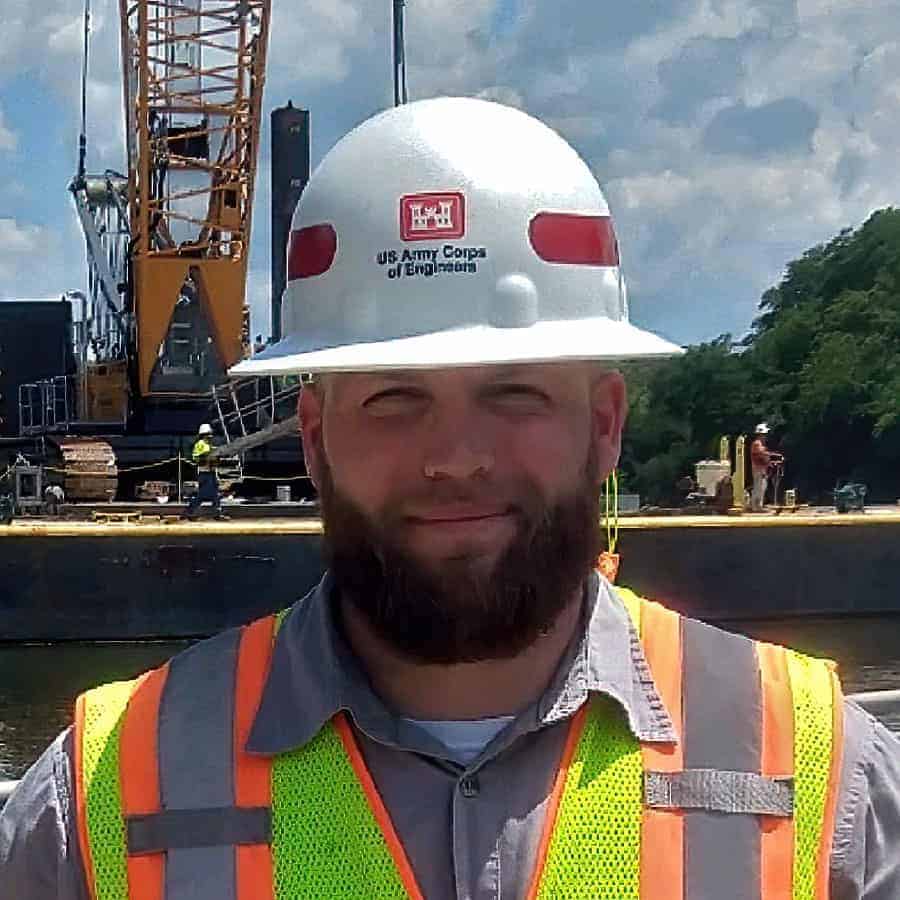In this episode, we talk to Stefan Flynn. P.E., a geotechnical engineer for the US Army Corps of Engineers Rock Island District, about flood restoration and his involvement in some major flood restoration projects, such as the Cedar Rapids project in Iowa, and the rebuilding of levees after the 2019 Midwest flooding.
Engineering Quotes:
Here Are Some of the Questions We Ask Stefan:
- How did you end up transitioning into an engineering career?
- How has your experience as a football player influenced your engineering leadership abilities?
- Can you tell us more about your involvement in the Cedar Rapids, Iowa, project to help protect the city from consistent annual flooding?
- When working on a large project, how do you make changes to your plans for global changes and rising sea levels when you already have completed the funding phase?
- What happened in the 2019 Midwest flooding, and what was your involvement in rebuilding these levees?
- What are the emergency procedures to follow during floods, and what should people not do during floods?
- How would you say engineers can help prevent and minimize the flooding of dams and levees?
- What final piece of advice would you like to give engineers out there?
Here Are Some of the Key Points Discussed About Flood Restoration:
- Stefan always knew that he wanted to be an engineer and build bridges. He double-majored while going to two different schools. Monmouth College allowed him to play football while working towards getting his degree.
- Being a fullback can be a selfless position to play, but you are still part of the team. Understanding how to overcome and lead through adversity is a big part of being a fullback. Do not play too high on the highs or too low on the lows. Ensure you can reset yourself quickly, even a few times a day if you plan on having any success. This mindset can easily be applied to engineering. When there are mistakes, accept them, learn from them, and then reset quickly after them. To project and instill this mindset in your team is a crucial part of leadership.
- Stefan is the Geotechnical Lead for the US Army Corps of Engineers on the Cedar Rapids, Iowa, project. The project is shared between the US Army Corps of Engineers and the city of Cedar Rapids. The initial estimates for this project were around $550 000 000. The US Army Corps of Engineers is mainly involved in the Eastside. As the geotechnical lead, Stefan has provided oversight to a diverse team of the Rock Island District, St Paul’s, and St Louis. The project is currently towards the end of the design phase, and a couple of structures have already been built. It puts the project somewhere near the halfway point since it started three years ago.
- When you already have received the funding for a large project, but changes must be made, you must address the changes as efficiently as you can. You must be adaptable and willing to take a step back to think about the changes and how they can be done.
- In 2019, there was widespread flooding in the Midwest. The flooding was caused by highly saturated soils due to having unusually wet seasons over the previous six months. The ASCE estimated the damages caused by the floods at $20 Billion. Working for the core, he was involved with the flood fight by assisting the local stakeholders and levee sponsors with technical guidance. You learn a lot from this kind of experience. You see the performance of a levee and what you are designing for, and how the community responds in emergencies.
- When preparing for floods, the most important thing is to ensure that the risk communication is done effectively. Everybody that could be affected by the failure of a flood control structure must know the extent of what could happen. Having this general awareness makes everyone more able to handle these extreme events. Have a plan that everyone already understands and knows what they should do if an extreme event occurs.
- Engineers can work towards minimizing the damage of floods by managing the risk with structural components. Making our systems better comes from continuously learning from these extreme events and applying the data to improve our decision-making and methods.
- Young engineers must pursue any opportunity that arises. It is these opportunities that further your experience, knowledge, and subsequently your career. Let people know what you are interested in because they will not know until you tell them. Never stop learning. In Geotechnical engineering, you will always be learning new methods and applying new technologies to assess what you cannot see. Take the time to get this additional education because the soil mechanics on any project must tie together.
More Details in This Episode…
About the Guest: Stefan Flynn. P.E.

Recently awarded the 2021 USACE Early Career Geoprofessional of the Year.
Memberships: ASCE/Geo-Institute Member, ASCE Geo-Institute Embankments, Dams, and Slopes Technical Committee Member, ISSMGE Member, USACE Groundwater Working Committee Member, USACE Instrumentation and Performance Monitoring Sub-Community of Practice lead for Navigation.
Currently, the lead geotechnical engineer for the $120M+ Cedar Rapids, IA Flood Risk Management Project, coordinating and overseeing efforts of geotechnical staff across multiple USACE districts and contracted A/E design firms.
About the Host: Jared M. Green, PE, D.GE, F.ASCE

Jared is a consultant and team leader who also enjoys mentoring young engineers and first-generation college students. He has been instrumental in increasing the number of pre-college students who are interested in STEAM majors and fields. He strives to make complex engineering topics relatable and understandable to people new to the field and to people who are completely unfamiliar with engineering. Jared and his family currently reside in Flemington, New Jersey. He and his wife have three energetic, inquisitive, and awesome children. You can connect with Jared here.
Sources/References:
US Army Corps of Engineers Rock Island District
Connect with Stefan Flynn. P.E., on LinkedIn
This Episode Is Brought to You by PPI

Please leave your comments or questions in the section below on flood restoration tips for geotechnical engineers.













